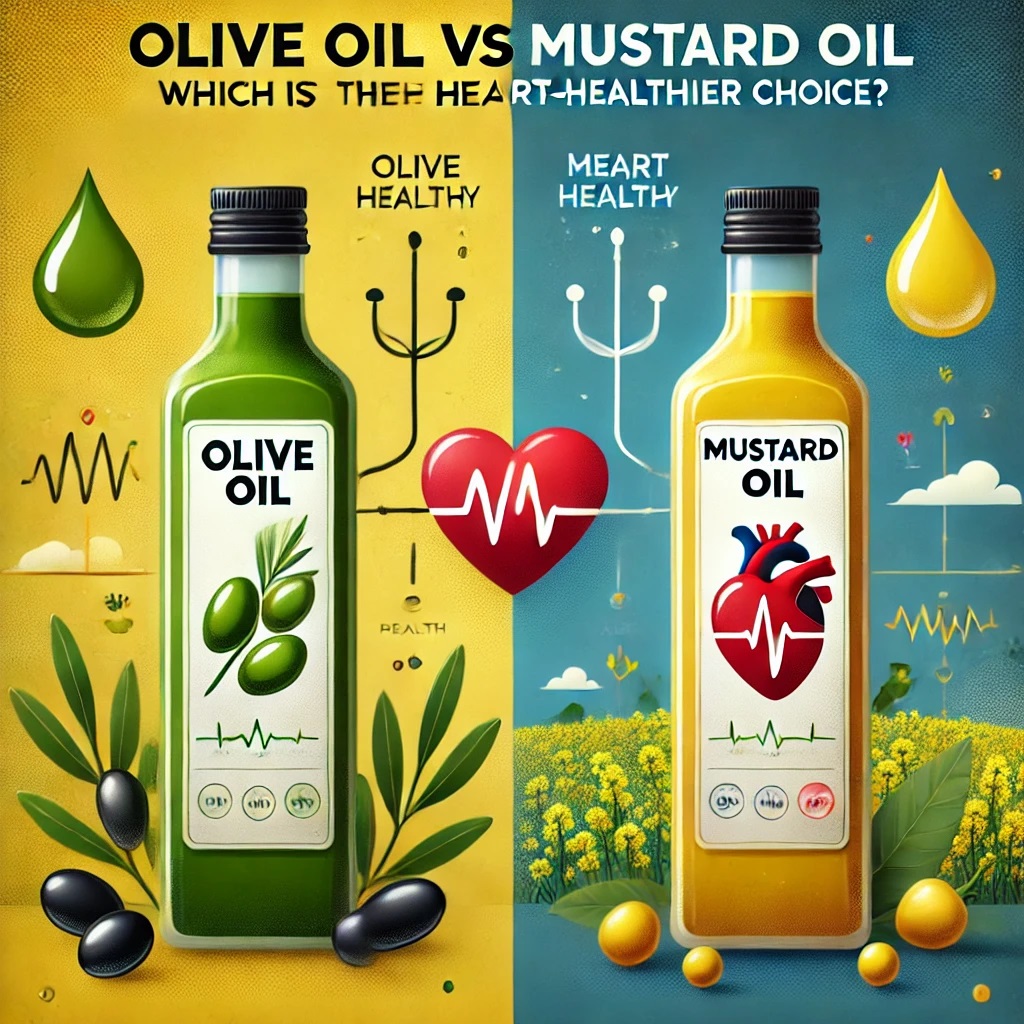Heart health is one of the most significant aspects of overall well-being, and the oils we use in cooking play a pivotal role in maintaining it. Olive oil and mustard oil are two popular choices, each with unique properties and benefits. But when it comes to your heart, which one truly stands out? Let’s dive deep into the nutritional profiles, health benefits, and expert insights to determine the winner in this battle of oils.
Understanding Olive Oil
1. Types of Olive Oil:
- Extra Virgin Olive Oil (EVOO): Cold-pressed, unrefined, and rich in nutrients.
- Virgin Olive Oil: Slightly less refined than EVOO but still healthy.
- Refined Olive Oil: Lacks some nutrients due to processing.
2. Nutritional Profile:
- Rich in monounsaturated fats (MUFAs)
- Contains antioxidants like polyphenols and vitamin E
- Low in saturated fats
3. Heart Health Benefits:
- Reduces bad cholesterol (LDL): MUFAs help lower LDL cholesterol levels, reducing the risk of arterial plaque buildup.
- Improves good cholesterol (HDL): Enhances HDL levels, promoting cardiovascular health.
- Anti-inflammatory properties: Polyphenols combat inflammation, a key factor in heart diseases.
- Regulates blood pressure: Olive oil’s natural compounds help maintain healthy blood pressure levels.
Exploring Mustard Oil
1. Types of Mustard Oil:
- Cold-Pressed Mustard Oil: Retains most nutrients.
- Refined Mustard Oil: Processed and may lose some health benefits.
2. Nutritional Profile:
- High in polyunsaturated fats (PUFAs), including omega-3 and omega-6 fatty acids
- Contains alpha-linolenic acid (ALA)
- Natural antioxidants like vitamin E and glucosinolates
3. Heart Health Benefits:
- Rich in omega-3 fatty acids: Essential for reducing triglycerides and inflammation.
- Balances cholesterol levels: Omega-3 and omega-6 fats contribute to a healthier lipid profile.
- Boosts circulation: Improves blood flow, reducing the risk of heart complications.
- Anti-microbial properties: Prevents infections that might indirectly affect heart health.
Comparing Olive Oil and Mustard Oil for Heart Health
| Feature | Olive Oil | Mustard Oil |
|---|---|---|
| Fat Composition | High in monounsaturated fats (MUFAs) | High in polyunsaturated fats (PUFAs), especially omega-3 and omega-6 |
| Anti-inflammatory | Rich in polyphenols; excellent anti-inflammatory agent | Contains omega-3 and glucosinolates for inflammation reduction |
| Cholesterol Benefits | Lowers LDL and increases HDL | Improves overall cholesterol balance |
| Cooking Suitability | Ideal for low to medium heat; great for salads | Suitable for high-heat cooking and deep frying |
| Taste | Mild and fruity | Pungent and spicy flavor |
Factors to Consider
1. Cooking Style:
- Olive oil is perfect for light sautéing, baking, and salad dressings. Its low smoke point makes it unsuitable for deep frying.
- Mustard oil’s high smoke point makes it ideal for Indian cooking and frying, where high heat is often required.
2. Nutrient Preservation:
- Olive oil’s nutrients are best preserved when used raw or at low temperatures.
- Mustard oil retains its properties even at higher temperatures, making it versatile for various cuisines.
3. Taste Preferences:
- Olive oil offers a mild, buttery flavor that complements Mediterranean dishes.
- Mustard oil’s bold, spicy taste is more suited for South Asian and Indian cuisine.
Which Is Better for Heart Health?
The answer depends on individual health goals and dietary habits:
- For Western Diets: Olive oil is an excellent choice, as it aligns with heart-friendly diets like the Mediterranean diet. Its monounsaturated fats and antioxidants have a proven track record of reducing cardiovascular risks.
- For South Asian Diets: Mustard oil is a natural fit due to its compatibility with high-heat cooking and traditional recipes.
